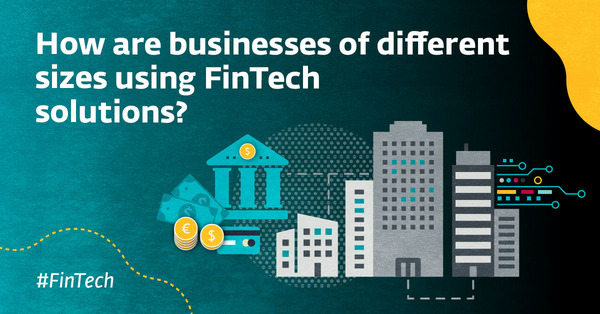
For the purposes of this blog, we have categorized small businesses as comprised of 2-49 people, medium as comprised of 50-499 and large as comprised of 500+.
Small and medium-sized enterprises (SMEs) have long been underserved by traditional financial providers. Yet, over the past few years, we have seen new FinTech offerings come to the marketplace designed specifically for small-scale operations. FinTech is no longer a choice restricted to the big corporations. We have seen innovative ways to make payments, manage money and get financing for businesses of all sizes.
Indeed, FinTech companies are broadening their offerings by designing solutions for small businesses. In return, small businesses are actively investing in new technologies, with 42%, in a recent ESET survey, aiming for better security of their finances. While this may not be quite as high as medium (80%) and large enterprises (81%), it seems that COVID-19 has acted as a catalyst, with the survey also finding that 62% of small businesses believe the pandemic has increased the need for improved security of finances.
The benefits for businesses investing in FinTech include reduction of costs, ease of use and lower barriers to entry. However, as the size of an organization naturally correlates with the budget available to spend on new technologies, here, we take a look at how different-sized enterprises have chosen to prioritize their use of FinTech solutions.
Online payments and accounting take the lead
It is perhaps no surprise that accounting functions like online payments and invoices showed the highest adoption rate for businesses of all sizes. From a list of various FinTech solutions, online payments was the most widely adopted by small (46%), medium (58%) and large (59%) businesses alike. This was closely followed by online accounting (small 41%, medium 57% and large 53%), online invoice financing and discounting (small 31%, medium 49% and large 47%), and online cashflow management (small 28%, medium 48% and large 45%).
Clearly, digital accounting has become a significant tool for small businesses, due to the benefits of streamlined systems, increased speed and productivity, and improved data security. Contrary to the notion that it is unnecessary for SMEs to digitalize due to their small scale, SMEs stand to benefit massively from adopting digital technologies to increase productivity, as well as to secure data and financial processes during recovery from the pandemic.
Big fish go for forward-thinking technologies
Where we see the medium and larger organizations storming ahead with their focus and investment is in the more forward-thinking FinTech solutions. So, while small businesses are dipping their toes in digitizing their accounting functions, medium and large businesses are further ahead in their use of branchless banks, online lending, InsurTech and RegTech.
Of these four forward-thinking technologies, InsurTech was the most adopted by medium (40%) and large (36%) businesses. According to a report by Deloitte, the pandemic shifted priorities toward increased investment in InsurTech because of the technology’s promise of “bolstering virtual customer engagement and operational efficiency.” The report states that “the amount of money invested in InsurTechs during the first half of 2020 remained remarkably robust, at nearly $2.2 billion.”
The COVID-19 pandemic has shifted the focus of all businesses, with many prioritizing plans to reduce costs, increase productivity and secure finances. FinTech solutions can offer a helping hand; it’s reassuring to see that some small businesses are benefiting as well.
For more information on how ESET can help businesses, head to our business solutions page.